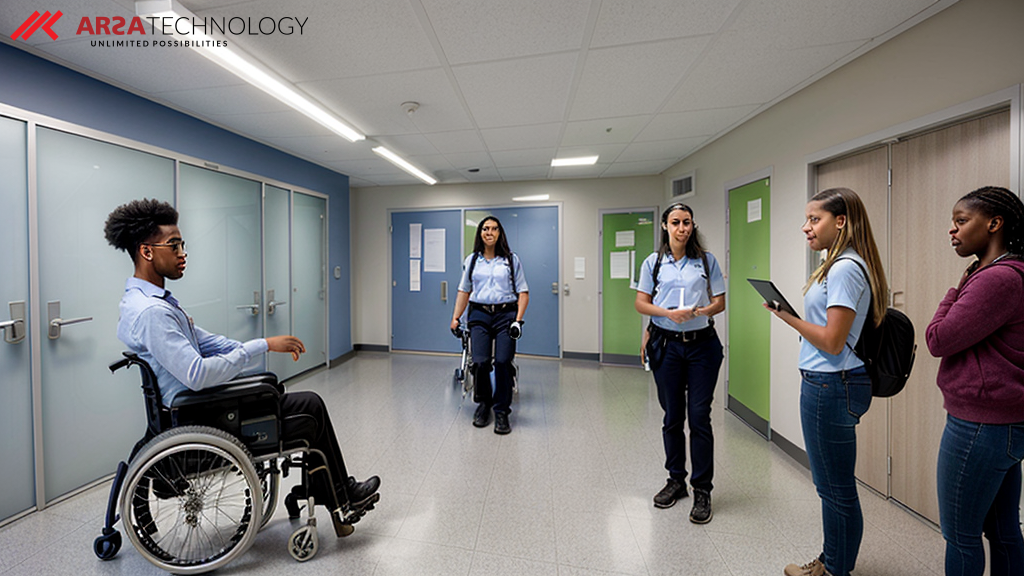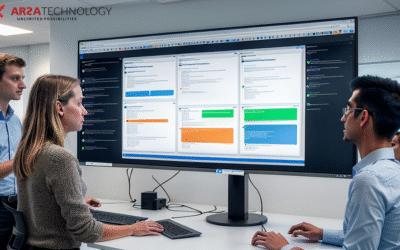Introduction: Overcoming Content Accessibility Challenges in Education through Enhanced Operational Efficiency
The pursuit of inclusive education is a cornerstone of modern learning institutions. A significant challenge within this pursuit is ensuring comprehensive content accessibility for disabled students. While often viewed through the lens of specialized tools and content formats, the broader operational efficiency of an educational institution plays a critical, albeit indirect, role in its ability to dedicate resources and focus to these vital accessibility initiatives. When administrative burdens are reduced and security protocols are strengthened, institutions are better positioned to invest in and deliver truly inclusive learning experiences.
ARSA Technology’s Face Recognition API offers a powerful solution that addresses these underlying operational inefficiencies. By automating critical processes like student attendance tracking and securing access to specialized resources, this advanced biometric technology frees up valuable human and financial capital. This strategic reallocation of resources can then directly support efforts to enhance content accessibility, develop personalized learning paths, and create a more equitable educational landscape for all students. This article explores how embracing cutting-edge biometric solutions can transform educational operations, ultimately fostering an environment where accessibility can truly flourish.
The Unseen Burden: How Inefficient Operations Hinder Accessibility Initiatives
Traditional methods of managing student attendance and access control in educational settings are often fraught with inefficiencies. Manual roll calls consume valuable class time, diverting educators from their primary teaching responsibilities. Paper-based systems are prone to errors, data loss, and require significant administrative overhead for collation and reporting. These inefficiencies are not merely minor inconveniences; they represent a substantial drain on institutional resources.
Consider the ripple effect: staff time spent on manual data entry and reconciliation is time not spent on developing accessible learning materials, training faculty on inclusive pedagogical practices, or providing direct support to students with disabilities. Budgetary allocations for administrative tasks could otherwise be directed towards assistive technologies, specialized educational content, or infrastructure improvements that enhance accessibility. The lack of accurate, real-time data also impedes informed decision-making regarding resource allocation for accessibility services, making it difficult to identify needs and measure impact effectively. This operational drag creates an invisible barrier, inadvertently slowing progress towards a fully accessible and inclusive learning environment.
Transforming Student Attendance: The Power of Face Recognition
The shift from manual to automated attendance tracking using Face Recognition API represents a paradigm shift for educational institutions. Imagine a system where students enter a classroom or lecture hall, and their presence is instantly and accurately recorded without any interruption to the learning process. This is the promise of ARSA Technology’s Face Recognition API.
This biometric solution offers unparalleled accuracy, significantly reducing errors associated with manual methods or card-based systems. It virtually eliminates the possibility of “buddy punching” or fraudulent attendance, ensuring that attendance records truly reflect student presence. Real-time data collection provides administrators and educators with immediate insights into attendance patterns, enabling proactive interventions for at-risk students. The time saved by automating this process is substantial, allowing educators to focus more on teaching and student engagement, and administrative staff to dedicate their efforts to more strategic tasks.
To see the API in action, try our interactive demo on RapidAPI. This hands-on experience demonstrates the simplicity and power of integrating advanced facial recognition into your educational systems. The efficiency gained from this automation directly translates into more resources available to address critical areas such as content accessibility for disabled students, ensuring that the institution’s commitment to inclusivity is supported by robust operational foundations.
Beyond Attendance: Securing Access to Specialized Learning Resources
While student attendance tracking is a primary application, the utility of Face Recognition API extends far beyond. In the context of content accessibility for disabled students, secure identity verification becomes paramount for managing access to specialized, often high-value, learning resources and assistive technologies. Many institutions provide bespoke software, hardware, or digital content tailored for students with specific needs. Ensuring that these resources are accessed only by authorized individuals is crucial for resource management, compliance, and preventing misuse.
ARSA Technology’s Face Recognition API can be integrated into access control systems for dedicated learning labs, specialized equipment, or digital platforms hosting accessible content. By requiring a quick, secure facial scan, institutions can verify the identity of the student attempting to access these resources. This layer of security is particularly important when considering the need for preventing fraud with liveness detection, which ensures that the person presenting their face is a live individual and not a spoof attempt using a photo or video. This robust secure identity verification solutions ensures that valuable accessibility tools are utilized effectively and exclusively by those who need them most, optimizing their impact and protecting institutional investments.
This secure access management not only safeguards resources but also builds trust and ensures that the infrastructure supporting disabled students is reliable and protected. It allows institutions to confidently allocate resources, knowing they are being used appropriately, thereby strengthening the overall framework for content accessibility.
ARSA Technology’s Face Recognition API: A Strategic Advantage for Education
Choosing the right technology partner is crucial for successful digital transformation. ARSA Technology is a leading provider of high-performance AI API products, engineered for global enterprises and developers. Our Face Recognition API stands out for its accuracy, speed, and reliability, making it an ideal choice for the demanding environment of the education sector.
Key advantages of partnering with ARSA Technology include:
* High Performance and Accuracy: Our API is built on state-of-the-art AI models, ensuring precise and rapid facial recognition, even in diverse conditions.
* Scalability: Designed to handle high volumes of requests, our API can seamlessly scale from small departments to large university campuses, accommodating growing student populations.
* Ease of Integration: While we don’t provide code examples here, our API is designed for straightforward integration into existing educational management systems, mobile applications, and web platforms, minimizing development effort.
* Global Reach and Support: ARSA Technology serves a global clientele, offering robust infrastructure and dedicated support to ensure smooth operation worldwide.
* Focus on Business Value: We emphasize translating complex technical capabilities into clear business benefits, helping institutions achieve measurable ROI through improved efficiency, security, and resource allocation.
By leveraging ARSA’s Face Recognition API, educational institutions can not only streamline their operations but also strategically reallocate resources towards their core mission, including the vital goal of enhancing content accessibility for all students.
Implementing Face Recognition: A Phased Approach to Educational Transformation
Successful integration of any new technology requires a thoughtful, phased approach. For educational institutions considering ARSA Technology’s Face Recognition API, the journey typically involves several key stages, all focused on maximizing impact and minimizing disruption.
1. Pilot Program: Begin with a controlled pilot in a specific department or a few classrooms. This allows for real-world testing, gathering feedback from students and staff, and fine-tuning the system to meet specific institutional needs. This phase is crucial for identifying potential challenges and demonstrating early successes.
2. Strategic Integration: Work with your development teams or system integrators to seamlessly embed the Face Recognition API into your existing Student Information Systems (SIS) or Learning Management Systems (LMS). The goal is to create a unified, intuitive experience for both students and administrators, ensuring data flows smoothly between systems.
3. Scalable Rollout: Once the pilot is successful and the integration points are robust, plan a phased rollout across the wider institution. This could involve expanding to more departments, buildings, or even entire campuses. A gradual expansion allows for continuous learning and adaptation, ensuring the technology is adopted effectively across the entire organization.
4. Continuous Optimization: Technology is not a static solution. Regularly review performance metrics, gather user feedback, and explore new features or enhancements offered by ARSA Technology to ensure the system continues to meet evolving needs and provides maximum value.
This structured approach ensures that the implementation of Face Recognition API is not just a technological upgrade, but a strategic investment that drives operational excellence and supports broader institutional goals, including the critical mission of fostering an accessible and inclusive learning environment.
Conclusion: Your Next Step Towards a Solution
The challenge of content accessibility for disabled students demands a multi-faceted approach, and operational efficiency is an often-overlooked but critical component. By adopting ARSA Technology’s Face Recognition API, educational institutions can move beyond the inefficiencies of traditional systems, transforming student attendance tracking and securing access to specialized resources. This not only streamlines daily operations but also liberates valuable resources that can be strategically redirected to enhance accessibility initiatives, develop more inclusive content, and support students with disabilities more effectively.
Embracing this advanced biometric solution is a strategic step towards building a more responsive, secure, and ultimately, more inclusive educational environment. It’s about empowering institutions to focus on what truly matters: delivering exceptional and accessible education for every student.
See Why ARSA is the Right Choice for Your Business.
Don’t just take our word for it. Schedule a free, no-obligation consultation with our API experts to discuss your specific needs and get a personalized performance and ROI analysis.







